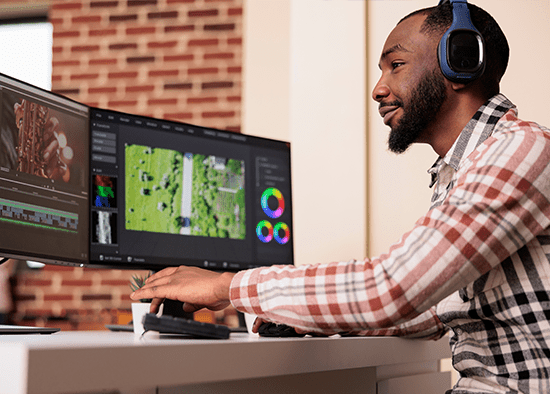How to Become a Video Editor

In recent years, digital video consumption is at an all-time high, thanks to an abundance of video sharing platforms, streaming services, and social media.
It’s no wonder the job market for film and video editors is projected to grow by 12% over the 10-year period of 2021-2031. (Source: U.S. Bureau of Labor Statistics.)
Tompkins Cortland Community College offers an A.S. Digital Cinema degree program that focuses on student learning in the aesthetics of cinema and technical proficiency for digital filmmaking. It provides insights across all areas of film production, writing, and animation within the motion picture and video industries. Students who study Digital Cinema at TC3 can go into a variety of careers, such as
- Film and Video Editors
- Producers and Directors
- Talent Directors
- Media Programming Directors, and more
Today we’re focusing on how to become a video editor. If you’re interested in earning a video editing degree, read on to see how the right training can help students become professional video editors in today’s job market.
Qualifications of a Video Editor
Becoming a film editor or a video editor requires both academic and hands-on learning. You’ll need to learn key skills for video editing, such as how to manipulate still and moving graphics, how to produce digital audio, how to use video editing software, how to create special effects, and more.
About 65 percent of working video editors hold a Bachelor’s degree, while around 16 percent hold an Associate degree. That’s why many students interested in becoming professional video editors enroll in programs that allow them to earn a degree. Many start out with an Associate degree program and then transfer for a Bachelor's degree. Others choose to attend technical schools for film production.
Typically students pursuing how to become a video editor take a mix of general education courses and specialized Digital Cinema courses.
Typical Job Description of a Video Editor
Becoming a film editor or a video editor requires a combination of technical and creative skills. To determine if a digital editing degree is a good fit for you, it’s helpful to look at the day-to-day job requirements of a video editor. Some duties include:
- Organize and string together raw footage into a continuous whole according to scripts or the instructions of directors and producers.
- Edit films and videotapes to insert music, dialogue, and sound effects, to arrange films into sequences, and to correct errors, using editing equipment.
- Select and combine the most effective shots of each scene to form a logical and smoothly running story.
- Review footage sequence by sequence to become familiar with it before assembling it into a final product.
- Set up and operate computer editing systems, electronic titling systems, video switching equipment, and digital video effects units to produce a final product.
View more daily tasks related to video editor jobs here.
Salary of a video editor
New film and video editors generally start with a yearly salary around $44,038. The median salary for film and video editors is $84,788 per year, while highly experienced workers can earn as much as $148,584.
In today’s gig economy, there are also many video editor freelance jobs available, which can vary widely in pay depending on whether or not you have a digital editing degree, as well as which skills for video editing you’ve acquired.
We hope we’ve shed some light on how to become a video editor. If you think a digital editing career could be right for you, check out TC3’s Digital Cinema program today.